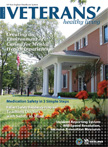Veterans' Healthy Living, Spring 2014
Patient Safety Residency Program:
Teaching Doctors with Safety in Mind
The VA Boston Healthcare System is working in collaboration with the Boston University (BU) Medical School to provide medical professionals valuable training focused on patient safety.
In the VA Quality and Patient Safety Medical Resident Program, led by Anand Kartha, MD, and David Thornton, MD, medical residents participate in a 1-3 week rotation, where they learn about patient safety issues ranging from falls and infection prevention to properly documenting a patient’s treatment.
Started in 2006, the program lowers potential errors by having front line providers like residents and students learn about and implement improvements like reducing delays in timely lab reporting, improving hand-offs, and reducing waste.
Pamela Bellino, Patient Safety Manager and faculty member of the program, was instrumental in bringing this much-needed curriculum to light. “I knew success was more likely if all levels of caregivers, including physicians and residents, were included since they work directly with the patients,” said Bellino. She helped develop the curriculum and mentors BU medical residents and students. Since 2006, approximately150 medical residents and 40 medical students have completed the patient safety program.

Patient safety goals are a key area of focus. During training, participants assess patient status and care, and then determine solutions to prevent a problem. An assessment may mean paying extra attention to a cardiac patient’s heart monitor in case the alarm goes off or improving the ordering process in the event that a transfused patient may need more blood. Even more common occurrences like fall risks, pressure ulcers, or hospital-acquired infections are assessed and proactively addressed.
Patient safety goals extend beyond in-patient care, providing follow-up care as the need is assessed. For example, patients under treatment for alcohol withdrawal issuesreceive both post discharge medical care as well as mental health treatment and support, such as meeting routinely with a social worker experienced with substance abuse issues.
Students also experience the business side of medicine, participating in policy and decision- making efforts. “There can be a disconnect between providing the care and the executive decisions that govern it,” Kartha said. “The program helps bridge that gap in a medical resident’s learning experience.”
Kartha adds that after completing the program, residents are appreciative for the opportunity to see medicine from a different perspective. This program is one of the many ways in which VA Boston Healthcare System staff provide better, safer care for our Veterans.
Mental Health Unit | Medication | Patient Safety Residency | Preventing Falls | Incident Reporting

















